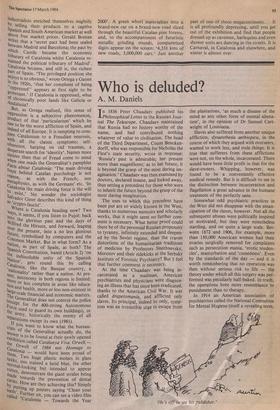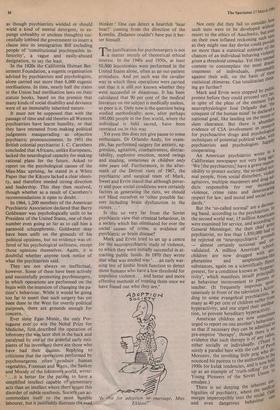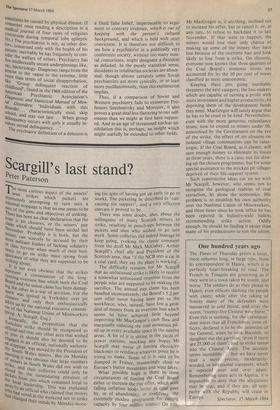Who is deluded?
A. M. Daniels
I1836 Peter Chaadaev published his 'Philosophical Letter in the Russian Jour- nal The Telescope. Chaadaev maintained that Russia had no history worthy of the name, and had contributed nothing whatever of value to civilisation. The head of the Third Department, Count Bencken- dorff, who was responsible for Nicholas the First's state security, wrote in response: `Russia's past is admirable; her present more than magnificent; as to her future, it is beyond the grasp of the most daring im- agination.' Chaadaev was then examined by doctors, declared insane, and locked away, thus setting a precedent for those who were to inherit the future beyond the grasp of the most daring imagination.
The uses to which this precedent have been put are so widely known in the West, thanks to numerous memoirs and scholarly works, that it might seem no further com- ment is necessary. What better proof could there be of the perennial Russian propensity to tyranny, infinitely extended and deepen- ed by the Soviet regime, than the craven distortions of the humanitarian traditions of medicine by Professors Snezhnevsky, Morozov and their sidekicks at the Serbsky Institute of Forensic Psychiatry? But I feel that further comment is necessary.
At the time Chaadaev was being in- carcerated as a madman, American psychiatrists and physicians were diagnos- ing an illness that has since been eradicated, thanks to the American Civil War. It was called drapetomania, and afflicted only slaves. Its principal, indeed its only, symp- tom was an irresistible urge to escape from
the plantations, 'as much a disease of the mind as any other form of mental aliena- tion', in the opinion of Dr Samuel Cart- wright of Louisiana.
Slaves also suffered from another unique affliction, dysaesthesia aethiopica, in the course of which they argued with overseers, wanted to work less, and stole things. It is true that sufferers from these afflictions were not, on the whole, incarcerated. There would have been little profit in that for the slave-owners. Whipping, however, was found to be a conveniently effective medical remedy. But it is difficult to see in the distinction between incarceration and flagellation a great advance in the humane treatment of the perfectly sane.
Somewhat odd psychiatric practices in the West did not disappear with the eman- cipation of the slaves, however. Not all the subsequent abuses were politically inspired or motivated, but they were nonetheless startling, and on quite a large scale. Bet- ween 1872 and 1906, for example, more than 150,000 American women had their ovaries surgically removed for complaints such as persecution mania, `erotic tenden- cies', masturbation and 'cussedness'. Even by the standards of the day — and it is worth remembering that no operation was then without serious risk to life — the theory under which all this surgery was per- formed was peculiarly half-baked. In truth, the operations bore more resemblance to punishment than to therapy.
In 1914 an American association of psychiatrists called the National Committee for Mental Hygiene (itself a revealing term, as though psychiatrists wielded or should wield a kind of mental detergent, to ex- punge unhealthy or unclean thoughts) suc- cessfully lobbied the government to insert a clause into its immigration Bill excluding people of 'constitutional psychopathic in- feriority', a vague and easily-abused designation, to say the least.
In the 1920s the California Human Bet- terment Foundation, a eugenic organisation advised by psychiatrists and psychologists, alone carried out more than 6,000 eugenic sterilisations. In time, nearly half the states in the Union had sterilisation laws on their statute books, based on the premise that many kinds of social disability and deviance were of an immutably inherited nature.
It must not be supposed that with the passage of time and old theories all Western psychiatrists have learnt humility, or that they have retreated from making political judgments masquerading as objective psychiatric pronouncements. In 1951 the British colonial psychiatrist J. C. Carothers concluded that Africans, unlike Europeans, lacked the neurological capacity for making rational plans for the future. Asked to report on the psychological causes of the Mau-Mau uprising, he stated in a White Paper that the Kikuyu lacked a clear identi- ty, and therefore needed strong direction and leadership. This they then received, though whether as a result of Carothers's recommendations is open to doubt.
In 1964, 1,200 members of the American Psychiatric Association declared that Barry Goldwater was psychologically unfit to be President of the United States, one of their number even going so far as to call him a paranoid schizophrenic. Goldwater may have been unfit on the grounds of his political opinions, but no evidence was of- fered of his psychological unfitness, except those opinions themselves. Again, it is doubtful whether anyone took notice of what the psychiatrists said.
They are not always so ineffectual, however. Some of them have been actively and successfully promoting psychosurgery, in which operations are performed on the brain with the intention of changing the pa- tient's behaviour. While it would be going too far to assert that such surgery has yet been done in the West for overtly political purposes, there are grounds enough for concern.
Ever since Egas Moniz, the only Por- tuguese ever to win the Nobel Prize for Medicine, first described the operation of lobotomy (he was later shot in the back and paralysed by one of the grateful early reci- pients of his invention) there are those who have had their qualms. Replying to criticisms that the operations performed by psychosurgeons often produce human vegetables, Freeman and Watts, the Sankey and Moody of the lobotomy world, wrote: ... it is better for the patient to have a simplified intellect capable of elementary acts than an intellect where there reigns this disorder of subtle synthesis. Society can ac- commodate itself to the most humble 'Is labourer, but it justifiably distrusts the mad
thinker.' One can detect a heartfelt 'hear hear!' coming from the direction of the Kremlin. Zhdanov couldn't have put it bet- ter himself.
The justification for psychosurgery is not a matter merely of theoretical ethical interest. In the 1940s and 1950s, at least
50,000 leucotomies were performed in the United States alone, often as an out-patient procedure. And yet such was the cavalier way in which these operations were carried out that it is still not known whether they were successful or disastrous. It has been calculated that 90 per cent of the medical literature on the subject is medically useless, so poor is it. Only now is the question being studied methodically: now, after perhaps 100,000 people in the free world, where the individual is held sacred, have been operated on.in this way.
, Yet even this does not give pause to some enthusiasts. Dr Orlando Andy, for exam- ple, has performed surgery for anxiety, ag-
gression, agitation, combativeness, distrac- tability, explosive emotion, mood swings and stealing, sometimes in children only nine years old. Furthermore, in the after- math of the Detroit riots of 1967, the
psychiatric and surgical team of Mark,
Sweet and Ervin stated that although pover- ty and poor social conditions were certainly
factors in generating the riots, we should not blind ourselves to 'other possible fac- tors including brain dysfunction in the rioters...'
Is this so very far from the Soviet psychiatric view that criminal behaviour, in a society which has eliminated for ever the social causes of crime, is evidence of psychiatric or brain disease?
Mark and Ervin tried to set up a centre for the neuropsychiatric study of violence,
to which they were initially successful in at- tracting public funds. In 1970 they wrote
that what was needed was ' ... an early war- ning test of limbic brain function to detect those humans who have a low threshold for impulsive violence... and better and more effective methods of treating them once we have found out who they are.'
this for adoption or marriage, Ekland?'
ye Sfpaeilettaoconsider such tests were to be developed with°11t resort to the ethics of Auschwitz, but eve", on their own inflated reckoning such as they might one day devise could pro no more than a statistical estimate of thevide tests chances of an individual behaving violently given a threshold stimulus. Yet they see content to contemplate the most drastic treatment of individuals, presulaahlY against their will, on the basis of these statistical chimeras. Can totalitarian think ing go further? Mark and Ervin were stopped by pub protest before they could proceed verY in spite of the pleas of the eminent Ya'" neurophysiologist Jose Delgado that 'the conquest of the human mind' be declared national goal, like landing on the ino°,1-1e„rt slum clearance. But there is abunna",. evidence of CIA involvement in research for psychoactive drugs and psychologi.,h techniques of potential political value, w1,11,, psychiatrists and psychologists haPP1' cooperating. An American psychiatrist wrote in a Californian newspaper not very long age: `We [the psychiatrists] have a grave resPnri. sibility to protect society, the so-called anr; mal people, from social disturbers, vi°Iedn. agitators, multiple murderers and drugs a„g dicts responsible for our increa"' violence, crime rates and deteriorating dreastpdesc,t, for law, and moral and social stun- But the 'so-called normal' are a decreas the sbeaenodo,dawccoorlrddiwngarto15thme iphisioycnhAiatatreisttisc.ottons were examined for service, and according ., General Menninger, the then chief arratoY psychiatrist, no less than 1,850,000 hands be rejected on `neuropsychiatric' grcala. — almost certainly notional and validated. A million American sow- children are now drugged with 1(e phetamine and substances, again on a scaiernnPtihfiectaainllyinfleilnil pretext, for a condition known as typera:r tivity', which manifests intself prineiPatot as behaviour inconvenient to parents on teacher. (It frequently improves si) or. taneously in front of the television.) Ace as evidence that such therapy is of argl,pyr is pre-emptive 'therapy', though there iajs iatrists,o_ ding to some evangelical psych many as 40 per cent of children suffer fr. II:, tion, to prevent hereditary hyperaetivitY._es hyperactivity, and one urged their sterilisa
American children are now sorrier urged to report on one another's behavic),11,0 so that if necessary they can be adrnittea_:0
either socially or individually. (1 .el surely a parallel here with the cult of P i% e_ Morozov, the revolting little prig 11-° the nou need his parents to the authorities Whew 1930s for kulak tendencies, and is new the up as an example of `truth-telling for to emulate.) 11 te.pioneers of the Soviet Uni° higTuhitetrees oisf nposyedhenying ttatry, whhe ere inherent amp Miss Odd Medic'.
merges imperceptibly into the social. _11 and even dangerous behaviour ca sometimes be caused by physical disease. (I remember once reading a description in a Medical journal of four cases of religious conversion during temporal lobe epileptic fits.) The psychiatrist is not, as other doc- tors, concerned only with the health of his Patient: inevitably he has frequently to con- sider the welfare of others. Psychiatry has few intellectually secure underpinnings like, say, bacteriology. Diagnoses range from the precise to the vague in the extreme, little More than terms of social disapprobation,
'Group delinquent reaction of childhood', found in the 1968 edition of the American Psychiatric Association's 'Diagnostic and Statistical Manual of Men-
tal Disorders: 'Individuals
with this
disorder... characteristically steal, skip scol, and stay out late... When group delinquency occurs with girls it usually in- volves sexual delinquency...
The psychiatric definition of a delusion is
a fixed false belief, impermeable to argu- ment or contrary evidence, which is out of keeping with the person's cultural background, and which is held with utter conviction. It is therefore not difficult to see how a psychiatrist in a politically very conformist society, without too many men- tal contortions, might designate a dissident as deluded. In the purely statistical sense, dissidents in totalitarian societies are abnor- mal: though almost certainly some Soviet psychiatrists act more cynically, or at least more pusillanimously, than this explanation implies.
Thus, if a comparison of Soviet and Western psychiatry fails to exonerate Pro- fessors Snezhnevsky and Morozov, it also proves a great deal less flattering to our self- esteem than we might at first have suppos- ed. And in an age of threatened nuclear an- nihilation this is, perhaps, an insight which might usefully be extended to other fields.
















































 Previous page
Previous page